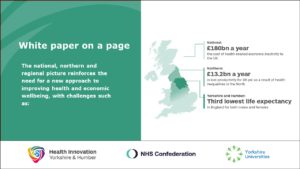Devolve power to regions to boost local economies and tackle health disparities, says white paper

Greater collaboration between mayoral combined authorities and integrated care systems could be key to alleviating health inequalities between Yorkshire and Humber and the rest of England as well as boosting economic activity.
A new white paper is calling on the government to devolve meaningful investment and powers to local places and integrated care system (ICS) leadership, empowering them to set targets and direct investment according to local needs.
The white paper, Empowering local places for health and prosperity: new perspectives from Yorkshire and the Humber from Health Innovation Yorkshire & Humber, has been co-produced by Health Innovation Yorkshire & Humber, Yorkshire Universities and the NHS Confederation. It sets out a series of recommendations to improve health and economic outcomes in Yorkshire and the Humber, and nationally.
The cost of health-related economic inactivity to the UK is estimated in the report at £180bn a year, and in the North of England, health inequalities cost the UK £13.2bn a year in lost productivity. The Yorkshire and Humber region has the third-lowest life expectancy for both males and females nationally; facts the paper argues “reinforces the need for a new approach to improving health and economic wellbeing”.

The paper states that new ways of working are needed to tackle the burden of inequalities nationally. ICSs, which were established in July 2022, have as their “fourth purpose” the task of unlocking the social and economic potential of the NHS, however many have struggled to make progress in the face of mounting pressure on services and financial constraints.
At the core of the white paper is the assertion that reductions in health and economic disparities are best achieved through a place-led approach that responds to the specific needs and characteristics of the people within those places. For place-led policy and interventions to be effective, it argues they must be delivered by a broad coalition of regional, local and community-based partners, working in partnership towards a common goal.

The white paper sets out 10 detailed recommendations, targeted towards specific national and regional leaders and business. To government, the report recommends the devolution of meaningful health investment and decision-making powers to the region’s mayoral combined authorities, increased investment into health innovation research and development, and collaboration with universities to address the barriers preventing the realisation of the NHS Workforce Plan targets.
At the regional level, the paper recommends that mayoral combined authorities continue to leverage the scale and convening power of local ICSs and other anchor institutions to empower a broad coalition of partners to take meaningful action on health. The white paper urges businesses to take action to support the health and wellbeing of their employees, and to take advantage of available support and best practice.
Richard Stubbs, Chief Executive of Health Innovation Yorkshire & Humber and one of the white paper authors, said: “The link between healthy people and a strong economy is now well understood, yet despite efforts by partners in our region and government in recent years, health and economic inequalities across Yorkshire and Humber continue to widen. We must look urgently to new ways of working to ensure our people, our economy and our health service cannot just survive but thrive.
“Our aim through this white paper is to shape a new model for addressing health and economic inequalities that delivers better outcomes, not just in Yorkshire but nationally.”
The full report can be accessed here.